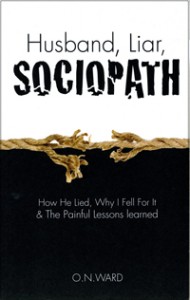Every week, a chapter of my book, “Husband, Liar, Sociopath: How He Lied, Why I Fell For It & The Painful Lessons Learned” (available via Amazon.com, just click on the title or book cover) will be published here on Lovefraud. To read prior chapters, please see the links at the bottom of the post.
Chapter 21: A Second Look
What was Paul really doing? What were the specific tools and techniques the master puppeteer employed that are also used by fellow sociopaths and manipulators? Paul started by using the technique of devaluing or minimizing my needs. As a sociopath, this came naturally to him, because a sociopath truly places zero value on anyone’s needs but his own. By Paul—someone I loved and respected—placing minimal or no value on my work, and without even knowing this was happening, I began to question the value I placed on my work and how important it was for me personally as well as for our family.
If I valued my client and my career, with a meeting scheduled Sunday morning and a package that was delayed, what option did I have but to work on Saturday? If my need was reasonable, which it was, then Paul’s behavior was unreasonable. To prevent me from reaching this conclusion, Paul went on the distraction offensive. He suggested that I misrepresented how long the project would take. Not only did this distraction technique create a temporary blind spot to the real issues, it also undermined my credibility (clearly, I could not accurately estimate how long my work would take) and my integrity (perhaps I misled Paul on purpose). This kept me on the defensive, and defending myself diverted me from Paul’s selfishness, arrogance, and sense of entitlement.
When I pointed out that it took me longer than expected because I had to juggle caring for Jessica and work, Paul accused me of accusing him of being the reason it took longer than expected to complete the assignment. This technique of accusing me of attacking him also put me on my heels and averted my focus from his selfish choices and behavior. He used this same technique after returning from our honeymoon when he said, “It seems you’re calling me a liar.”
Paul’s entitled attitude and the fact that he acted so superior were also subtle methods of manipulation. He spoke and acted on the assumption I was never to inconvenience or disappoint him, but he was permitted to inconvenience and disappoint me at will. He also placed himself above watching his daughter while I worked. By acting so superior, Paul actually increased the likelihood that I would view him as superior and capitulate to his views.
Then Paul invoked my pity by pointing out how hard he worked. He upped the ante by implying that he was underappreciated. Since I am an empathetic person, I am hardly going to kick someone when he or she is down. In fact, if I feel badly for someone, like most people, I will try to make that person feel better. So, what did I do? I apologized! But through all the selfish behavior and the ruining of our one-on-one time together, Paul did not apologize for anything he did or said. He took no responsibility. It was all my fault.
Never having to say, “I’m sorry,” is not a sign of love, as that ridiculous line in Love Story suggests. Quite the contrary, it is a clue you may be dealing with a sociopath. Sociopaths do not apologize, or if they do, the apology is insincere (and your intuition is likely to tell you this). It comes down to sociopath math. In Paul’s mind, my needs did not count. As a sociopath, he felt no empathy for me. Why should he apologize when I did not matter to him, other than to serve his needs, a duty at which I had just failed miserably?
Regardless of whatever Kool-Aid I had been drinking in the past, the clarity of the double standard was unshakable that weekend. There was no way to excuse it away or reframe it. Yet, while the double standard in our relationship was clear, what was not clear was what to do about it. If I had known about sociopaths and realized that Paul’s behavior was sending out huge warning signs that he was a sociopath and had only married me so I could be the logistics coordinator for his life and that he would never put my needs or the needs of our daughter before his, then I should have left Paul right then. I could have easily rebuilt my life as a single mother. I had a wonderful education (my MBA was only a few years old), a career on which I could build, a family not too far away, and supportive friends down the street. Also, I was in my late thirties, athletic, and still quite attractive, so there remained a strong possibility that my future might still involve a loving and meaningful relationship.
I did not know that sociopaths “walk among us” and that I was getting clear signals that Paul was one of them. Instead, I struggled to understand how big a deal this double standard of Paul’s was and what I should do about it. After all, for the first time in years, I was happy in other aspects of my life—I loved being Jessica’s mom; I had a successful new business venture that gave me the flexibility I needed to function as a full-time, stay-at-home mom; I had good friends and a nice house; and I thought Paul and I were building considerable financial security together. Although Paul was rarely home, we talked each night when he called, and we did share intimate time together when he was home. It was unclear if this double standard was worrisome enough that I should put the rest of my life at risk.
What was clear was that if I did not want to incur Paul’s disapproval, my work and personal life had to be invisible to him, one hundred percent of it conducted when Paul was away, engaged in a project of his own, or asleep. But with Paul away so much, how much of a sacrifice was that on my part? Surely, I could do that to keep the peace and to keep our family intact, especially because after a year of trying unsuccessfully, and with my fortieth birthday on the horizon, I was pregnant with our second child..
Start from the beginning:
Go to previous chapter:
Go to the next chapter:
Notes
Identifying names, places, events, characteristics, etc. that I discuss here and in my book have been altered to protect the identity of everyone involved.





































 Domestic violence and brain trauma
Domestic violence and brain trauma
becomingstrong
Thank you ON Ward. Domination is key in their lives because everything is about winners and losers. In the sociopathic math as you call it there can be only one winner and that is the sociopath. The rest is us who think we are on the same team have to be losers. Questions like, why can’t we both successful at our careers (win/win)? Why can’t we both be held in high esteem with our children (win/win/win)? Nope there must be losers in this equation. Problem is when they make us losers they also lose.
Hope Springs
Logistics coordinator. Yes, that is all we become and are, for the P/SP.
That is very good 🙂
NotWhatHeSaidofMe
Yes, ON Ward, another spot on analysis. Again, so many parallels in my story that I have mentioned before.
I KNEW something wasn’t right, but 1) I didn’t know about sociopaths and that it wasn’t my fault, and that it was incurable. 2) I didn’t know what to do about it.
I grew up with personality disordered family members, only I had just thought of them as lowlifes. I didn’t know that such a childhood would condition me to unconsciously choose a sociopath because he FELT FAMILIAR to me and because he offered what I had wanted in my childhood, that the crazy people would LOVE ME (or at least pretend to).
I, too, was in my late 30’s when I realized that there was no future for me in my marriage, but I was told by a marriage counselor that I needed to focus on his needs (treat him like a KING! – as if I wasn’t already doing that…)and my troubles would resolve when I stopped being selfish. I had a good education and my degree was only a few years old, I had lost contact with friends but it had been only a few years, I could reconnect. BUT… b/c I thought it was all my fault, that I was a failure, and that there was a solution, and… the most damning of all, that he’d found how to control me, by brainwashing my child to think he was the greatest ever and triangulating her against me so that she’d chose him in a divorce, and there was no way I was divorcing without custody of my own child (NOT HIS bio child, MY bio child). I would NOT abandon my child to someone I considered cruel and controlling.
So sad b/c if I had only known about sociopaths, all those counselors and not a single one told me about personality disorders, rather they told me how I was deficient… until I found my jewel who said she was going against her training and told me to run, run far, and never look back, and even she didn’t tell me about sociopaths, only that he was an abuser. I spent years thinking he was an abuser b/c I was “co-dependent”. Eventually I learned, I was NOT do-dependent, I was scammed, and not just by him, scammed also by the mental health clinicians that I turned to for help.
Diane111
Love reading your chapters, O.N.Ward … always spot on! Like you, I’m an empathetic person. Although having this trait brings its own set of problems, like feeling sorry for someone when they really don’t deserve it, I wouldn’t want to be any other way 🙂
What hit home for me in this chapter was my SP isn’t preventing me from doing anything. I do things and go places and see my family, etc. One would think, “what a great husband”. However, I do those things without him and usually when he’s at work and never at the house. Meaning … if I want to see the grandkids, not a problem, but I have to go over to their house. Granted, he has never said they couldn’t come to the house, BUT when they have been there, he made the time SO stressful that I decided it would be best if they didn’t come to the house anymore, or if they did, it would be for short period of time. He still controlled and continues to control.